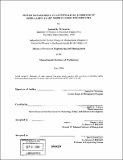Power management as a system-level inhibitor of modularity in the mobile computer industry
Author(s)
Weinstein, Samuel K. (Samuel Keith), 1974-
DownloadFull printable version (5.116Mb)
Other Contributors
System Design and Management Program.
Advisor
Daniel E. Whitney.
Terms of use
Metadata
Show full item recordAbstract
Since the mid-90s, the computer industry has been very modular with respect to both product architecture and industry structure. The growing market size of mobile computers means that the challenges facing this segment are starting to affect the direction of the industry. It is argued in this paper that power management in mobile computers is forcing the industry in the direction of more integral product solutions and, hence, a more integral industry structure. That is to say, the industry is assuming a structure similar to the early days of mainframe computers when one firm delivered the entire proprietary integral system. Furthermore, this trend towards more integrality in mobile computer systems is due to fundamental physical attributes of the system; specifically, that information transfer systems lend themselves more readily to modular architectures than systems that transfer significant power. Thus, as processors and mobile computers become more powerful, they start to behave more like power transfer systems and side effects of this power, such as heat, require a more integral approach to managing it. A "free body" diagram framework is presented which provides a way of thinking about how integrality forces are acting on an industry's trajectory. Evidence is presented showing how the dominant player in the computer supply chain, Intel, is exhibiting this vertical/integral behavior in a number of ways.
Description
Thesis (S.M.)--Massachusetts Institute of Technology, System Design & Management Program, 2004. Includes bibliographical references (p. 88-90).
Date issued
2004Department
System Design and Management Program.Publisher
Massachusetts Institute of Technology
Keywords
System Design and Management Program.